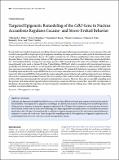Targeted Epigenetic Remodeling of the Cdk5 Gene in Nucleus Accumbens Regulates Cocaine- and Stress-Evoked Behavior
Author(s)
Heller, E. A.; Hamilton, P. J.; Burek, D. D.; Lombroso, S. I.; Pena, C. J.; Nestler, E. J.; Neve, Rachael L.; ... Show more Show less
DownloadHeller-2016-Targeted Epigenetic.pdf (1.083Mb)
PUBLISHER_CC
Publisher with Creative Commons License
Creative Commons Attribution
Terms of use
Metadata
Show full item recordAbstract
Recent studies have implicated epigenetic remodeling in brain reward regions following psychostimulant or stress exposure. It has only recently become possible to target a given type of epigenetic remodeling to a single gene of interest, and to probe the functional relevance of such regulation to neuropsychiatric disease. We sought to examine the role of histone modifications at the murine Cdk5 (cyclin-dependent kinase 5) locus, given growing evidence of Cdk5 expression in nucleus accumbens (NAc) influencing reward-related behaviors. Viral-mediated delivery of engineered zinc finger proteins (ZFP) targeted histone H3 lysine 9/14 acetylation (H3K9/14ac), a transcriptionally active mark, or histone H3 lysine 9 dimethylation (H3K9me2), which is associated with transcriptional repression, specifically to the Cdk5 locus in NAc in vivo. We found that Cdk5-ZFP transcription factors are sufficient to bidirectionally regulate Cdk5 gene expression via enrichment of their respective histone modifications. We examined the behavioral consequences of this epigenetic remodeling and found that Cdk5-targeted H3K9/14ac increased cocaine-induced locomotor behavior, as well as resilience to social stress. Conversely, Cdk5-targeted H3K9me2 attenuated both cocaine-induced locomotor behavior and conditioned place preference, but had no effect on stress-induced social avoidance behavior. The current study provides evidence for the causal role of Cdk5 epigenetic remodeling in NAc in Cdk5 gene expression and in the control of reward and stress responses. Moreover, these data are especially compelling given that previous work demonstrated opposite behavioral phenotypes compared with those reported here upon Cdk5 overexpression or knockdown, demonstrating the importance of targeted epigenetic remodeling tools for studying more subtle molecular changes that contribute to neuropsychiatric disease.
Date issued
2016-04Department
Massachusetts Institute of Technology. Department of Brain and Cognitive Sciences; McGovern Institute for Brain Research at MITJournal
Journal of Neuroscience
Publisher
Society for Neuroscience
Citation
Heller, E. A. et al. “Targeted Epigenetic Remodeling of the Cdk5 Gene in Nucleus Accumbens Regulates Cocaine- and Stress-Evoked Behavior.” Journal of Neuroscience 36.17 (2016): 4690–4697.
Version: Final published version
ISSN
0270-6474
1529-2401